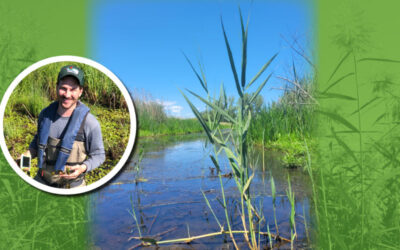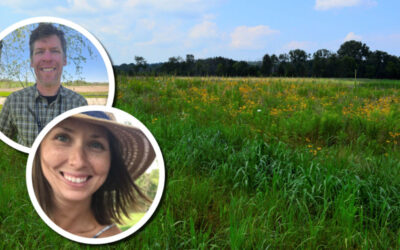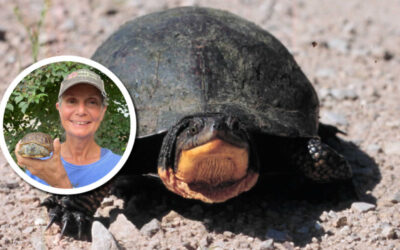Wetland Coffee Break
The Wetland Coffee Break series helps keep our community of wetland lovers connected and learning about wetlands throughout the year, from anywhere! Bring your coffee and learn about wetlands, the plants and animals that call them home, and the many natural benefits they provide to our communities. Sessions are held on Zoom and feature time for audience Q&A.
See below for a list of upcoming presentations and to register. Once you register, you’ll receive an automatic email including the URL link and password you’ll need to access the meeting. We record and post each presentation so you can watch any that you missed live. You’ll find links to these recordings below, and you can also find them on our Facebook page.
We are grateful to all of the presenters for sharing their knowledge and expertise and to everyone interested in learning more about wetlands! If you are interested in giving a Wetland Coffee Break presentation, or if you have a wetland topic you’d like to see covered, please contact Katie.Beilfuss@wisconsinwetlands.org.
We are now able to provide attendance verification to Wetland Coffee Break audience members who attend the live sessions and request this service. We created this mechanism in response to requests from members of the Wetland Coffee Break audience who would like to apply their Wetland Coffee Break learning to their continuing education or certification requirements. Learn more about how to receive attendance verification here.

Register for a Wetland Coffee Break
Makak Aabajitoon Ganawendang Manoomin: Guiding wild rice conservation with Anishinaabe worldview
Brandon Byrne, Great Lakes Indian Fish & Wildlife Commission, and Blaine Rothrock, Northwestern University
Friday, July 18, 2025
10:30 am CT
Description
Manoomin (wild rice) occurs throughout the western Great Lakes basin. It played a central role in the Anishinaabe migration story and has long been sacred in sustaining the Anishinaabe lifeway. Abundance of manoomin has declined in recent decades on lakes once supporting major beds in Wisconsin. Manoomin has garnered significant research interest in recent years due to its importance to the identity of Ojibwe and other Indigenous peoples inhabiting the Great Lakes region. Historically, research efforts excluded Traditional Ecological Knowledge; however, with clear alignment of goals, collaborative research can complement tribal interests, strengthen partnerships, and lead to higher impact. Using a co-design approach, researchers at the Georgia Institute of Technology and Northwestern University collaborated with Ojibwe nations and the Great Lakes Indian Fish and Wildlife Commission to develop a low-cost remote sensor to monitor environmental factors affecting manoomin.
Brandon Byrne is an Inland Fisheries Biologist for the Great Lakes Indian Fish & Wildlife Commission (GLIFWC). His work focuses on assessing inland fish populations in northern Wisconsin and Michigan and assisting GLIFWC member Tribes with the protection of Ceded Territory fish populations and habitat. Brandon previously co-managed GLIFWC’s Manoomin Program as a Wetland Ecologist.
Blaine Rothrock is a Computer Science PhD candidate at Northwestern University. He earned his master’s degree in artificial intelligence from Northwestern University and his bachelor’s degree in informatics from Indiana University. Blaine’s work focuses on novel applications of health wearables and environmental sensors, with the ultimate goal of democratizing access to the development of ubiquitous embedded devices to promote research, creativity, and education.
Investigating the relationship between showy ladyslipper and European skipper butterflies
Matt Knickelbine, Stantec
Friday, Aug 1, 2025
10:30 am CT
Description
While working on wetland delineations, environmental scientist Matt Knickelbine has been observing instances of showy lady slipper (Cypripedium reginae) flowers being filled with dead European skipper butterflies (Thymelicus lineola). Showy lady slipper is an inhabitant of a variety of wetland types and is susceptible to many other stressors, including deer browse, habitat destruction, and changes to groundwater processes. European skipper butterflies were introduced to North America by accident in 1910 and require hayfields near nectar sources. Showy lady slipper is a species of special concern in Wisconsin, endangered in Illinois. It is protected by law as the State Flower of Minnesota. Learn about Matt’s observations, past accounts of this phenomenon that Matt discovered in the literature, and ideas for future research.
Matt Knickelbine is an environmental scientist at Stantec and a Wisconsin DNR Assured Wetland Delineator. He mostly works on wetland science and botany projects but also has experience in restoration ecology, wildlife surveys, and landscape-level ecology, to name a few.
Taxonomy, natural history, and conservation of Wisconsin fireflies
Dan Young, UW-Madison
Friday, August 8, 2025
10:30 am CT
Description
Tune in to learn about one of our favorite signs of summer—fireflies! Dan Young, Professor of Entomology at UW-Madison, will describe the critical role wetlands play for these insects. He’ll start by defining what we mean by “firefly” and providing an overview of this group of Wisconsin fauna. He’ll share a quick overview of bioluminescence throughout the greater tree of life, describe how biological light is produced in fireflies, and discuss the evolution and significance of bioluminescence with respect to the biology and natural history of fireflies. Dr. Young will wind up his presentation with comments relating to an observed general decline in firefly populations in many parts of North America and notes on firefly conservation.
Dr. Dan Young has been directly associated with all aspects of entomological research collections since his first curatorial hourly position as a sophomore undergraduate at Michigan State University. In addition to serving as Director of the Wisconsin Insect Research Collection, he is Co-Chair of the UW Natural History Museums Council and serves as liaison between the internationally recognized Entomological Collections Network and Society for the Preservation of Natural History Collections. He has visited and conducted taxonomic research in entomological research collections across North America and around the world.
Hydrology and Hydraulics 101
Dave Kraft, Hey & Associates, Inc.
Friday, Aug 22, 2025
10:30 am CT
Description
The hydrology and hydraulics of the watershed and waterways that we work in are key drivers to understanding wetlands and developing preservation and restoration approaches. How much water there is and how it navigates the landscape can also influence regulatory needs. This presentation will provide wetland scientists and other practitioners with an introductory understanding of hydrology and hydraulics, or H&H, and how to work with the water, not against it.
Rooted in a deep passion for the outdoors, Dave Kraft has over 20 years of professional experience in water resources engineering with a focus on restoration of natural wetland and stream systems in a wide range of settings. Mr. Kraft holds a BS in Civil/Environmental Engineering from UW Madison and is a registered Professional Engineer in Illinois and Wisconsin.
Watch previous presentations
Click “Older Entries” below to see more past presentations, or view our Google Sheet index of past presentations here.
Wetland Coffee Break: Wetlands and Phragmites: Management at a landscape scale
Presenter Matt Puz discusses wetland dynamics as well as Phragmites biology and ecology, and how understanding these two concepts can lead to more effective management.
Wetland Coffee Break: Restoring wetlands in the Mukwonago River watershed
Hear about the the experience of project planning, restoration, and maintenance of the Mukwonago Davis Restoration Project, and the trials and tribulations of implementing a large wetland restoration project through key partnerships.
Wetland Coffee Break: Let’s talk turtles!
Ever wonder what kind of turtle you just found crossing the road, or how to tell one kind of turtle from another, or where to look to find them?
Wetland Coffee Break: What’s the buzz? Drone uses in wetlands
Drones can do a lot more than take pretty pictures. We can now utilize drones for high-resolution imagery, artificial intelligence, spraying invasive species, or seeding native species.
Wetland Coffee Break: Floristic quality benchmarks for rare and unique wetland plant communities
Ryan O’Connor (WDNR) shares what makes rare wetland plant communities like white pine-red maple swamps and interdunal wetlands unique, what threats they are facing, and more.
Wetland Coffee Break: Wild rice with fish: A winning recipe for restoration
Green Bay wetlands serve as important fish habitat and successful wild rice restoration may be an indicator of diverse, healthy wetland ecosystems that provide valuable benefits to fish, wildlife, and people.






